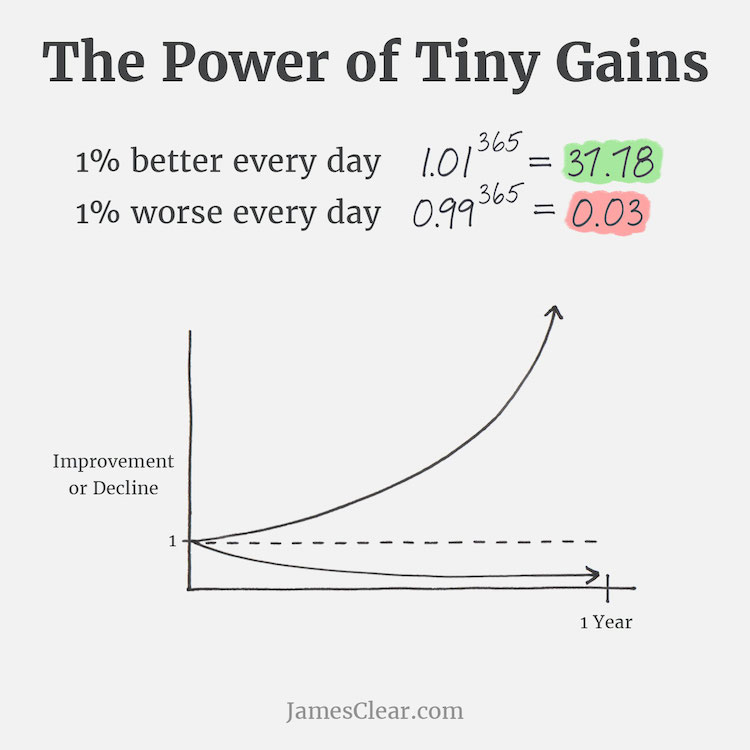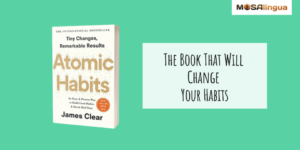It might seem counter-intuitive, but the truth is that you don’t need to make superhuman effort to get super results. And that’s great news for all of us. Most people don’t have the time to dedicate hours to improving their skills, but even the busiest people can find the time to make meaningful progress. All you need to do is get 1% better every day over time. This is a popular concept in the personal development field, and it can very easily translate to the language learning process.

Applying the “1% Better Every Day” Approach to Languages
In his bestseller Atomic Habits, author James Clear uses a mathematical formula to illustrate this 1 percent rule. If you work every day for a year, you’ll end up improving your skills by a factor of almost 38!
Here’s the idea:
I find this idea powerful and motivating.
In this article, I’m going to concentrate on one question:
How can language learners use this rule to help them make meaningful progress over time?
If you’d like to read more about this concept, you can find the link to an article by James Clear at the bottom of this page.
How can I use the “1% Better” rule when learning a language?
In general, the idea of improving by just a little bit every single day makes a lot of sense to me. In fact, the MosaLearning® Method was designed around 10- to 15-minute daily “micro-sessions” to keep learners exposed to their target language on a regular basis.
But because James Clear frames his argument in mathematical terms, I asked myself if it was true that a language learner could really become 38x better at their target language if they worked to be 1% better every day for one year.
My conclusion is that it depends on your starting level:
- If you’re a true or a false beginner:It’s a fact that if you work for even ten minutes per day for 3, 6, 9, or 12 months, you’ll see exponential progress in your linguistic abilities. You’ll move from understanding nothing to being able to understand much of what you hear and express yourself on a variety of topics.
This is super motivating and rewarding!
We encourage you to start right away and to keep at it consistently for at least 3-6 months. You’ll be impressed with what you see!
- If you’re an intermediate learner:
You’ve probably experienced it for yourself. Exponential progress comes to an end once you reach an intermediate level. This is a well-known phenomenon known as “the intermediate plateau.”Some learners lose their motivation at this stage because they feel like they’ve begun to stagnate. It’s hard to watch your progress slow down and still feel like you’re moving toward your goals.But stay positive! It’s true that you’re progress is slower, but it’s important to acknowledge that you’ve already achieved a good level. Accept that your future progress will be less visible.
With a bit of perseverance, patience, and a good method, you’ll continue to grow and fine-tune your skills!
Conclusion
In both cases, I think that the “1% better every day” rule can be very useful.
Of course, we know that it’s not really possible to quantify language learning. Also if you’re starting from a higher level, your progress will be slower and even more difficult to measure.
But the real beauty of this approach is that it pushes us to learn a little every day. If you’re familiar with the MosaLearning® Method, you know that establishing a learning habit early in your language journey is one of the most important things you can do.
The Japanese concept of “kaizen” reflects this idea beautifully. This word combines the words “kai” (change) and “zen” (better). In English, it’s often translated as “continuous improvement.” The repetition of small but meaningful actions leads to improvement and growth over time.
Next Steps
If you’d like to read more on the subject, check out:
- James Clear’s article Continuous Improvement: How It Works and How to Master It
- Habits of Successful Language Learners that You Should Adopt Today
- The Chain Technique | Language Learning Methods [VIDEO]
Related posts:
Start learning a new language today

Good news: we can help!
More good news: you can get started for free! Start your free trial now and for the next 15 days, take advantage of the most effective language learning method on the market!
Vocabulary flashcards, videos with subtitles, audiobooks, articles adapted to your level – with MosaLingua Premium (Web & Mobile), you’ll have access to all this and more. Get started right now. It’s free—and risk-free—to try!





Comments